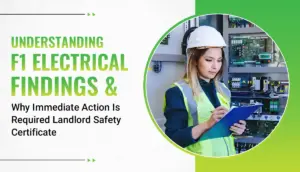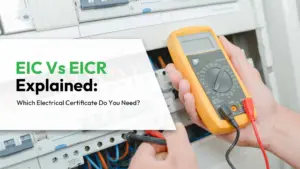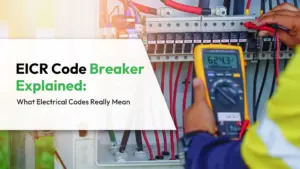As a business owner or property manager in the UK, you’re likely aware of the many regulations that govern the safety and integrity of your operations. Among these, the Electrical Installation Condition Report (EICR) plays a vital role in ensuring compliance and safety. You might wonder, is EICR a legal requirement for business? The answer is yes, it’s a critical obligation that helps protect your property, employees, and customers.
Neglecting this duty can lead to serious consequences, from legal penalties to dangerous electrical hazards. You’re responsible for ensuring that your electrical systems are not only functional but also free from defects that could cause significant harm. Now, consider the potential risks and costs of failing to comply with this essential requirement. Are you prepared to face them?
Table of Contents
ToggleKey Takeaways
- EICR is mandated under the Electricity at Work Regulations 1989 to ensure electrical safety in business environments.
- Compliance with BS 7671 is required, with regular updates to reflect best electrical safety practices.
- Employers and landlords are responsible for arranging regular EICRs to maintain safety and compliance.
- Businesses must conduct EICRs every 5 years, while industrial sites, such as factories, may require more frequent inspections.
- Non-compliance can result in legal actions, fines, and increased insurance premiums, emphasising the importance of adherence.
What an EICR Is and Why Businesses Need It
An Electrical Installation Condition Report (EICR) is a formal document produced after a thorough inspection and testing of a property’s electrical systems, with particular focus on safety.
As a business owner, you’re not just dealing with products or services; you’re also responsible for guaranteeing a safe environment for your employees and customers.
Faulty electrical installations can pose severe hazards, including fires or electric shocks, that can cause injuries, fatalities, or significant damage to your property. By securing an EICR, you’re taking an essential step in identifying potential electrical issues before they become serious problems.
Failing to have a current EICR can also lead to legal consequences, especially if an electrical fault results in an accident.
The EICR test assessment ensures your electrical systems are up to standard, protecting your business from unforeseen liabilities and maintaining continuous operation without electrical faults.
What Does an EICR Test Involve?
A commercial EICR test, essential for guaranteeing your business’s electrical safety, begins with visual inspections. This initial stage involves a qualified electrician examining the physical condition of your electrical installations.
They’ll look for any signs of damage or outdated components that could pose risks. This process involves spotting hazards before they escalate.
Following the visual checks, the inspection moves on to more detailed circuit testing to verify that all electrical systems function correctly and safely. This includes:
- Continuity Testing: Verifies that there are no open circuits in your wiring.
- Insulation Resistance Testing: Guarantees that the electrical insulation material is intact and performing as expected.
- Earth Fault Loop Impedance Testing: Confirms that the earth connection is effective and will safely conduct any fault current.
The final phase of an EICR is safety verification. Here, the electrician checks compliance with current electrical standards and regulations, ensuring that all systems remain safe for continued use.
This thorough assessment helps you catch issues early, preventing costly repairs or dangerous accidents down the line.
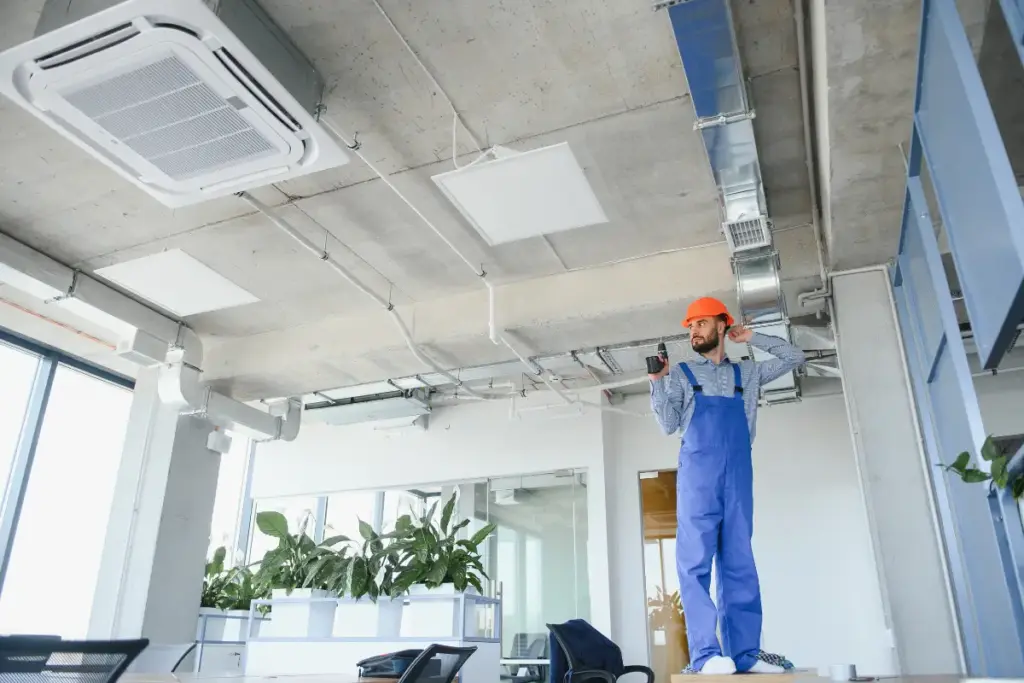
Key UK Regulations That Require EICR Compliance
Many business owners often ask, “Is EICR a legal requirement for business?” You must understand the key UK regulations mandating EICR compliance to ensure your business complies with legal standards for electrical safety.
Primarily, the Electricity at Work Regulations 1989 require you to maintain electrical systems to prevent danger. This isn’t just a suggestion, it’s a legal obligation. The regulations don’t specify how to perform this maintenance, but an Electrical Installation Condition Report (EICR) is a widely recognised method to ascertain compliance.
Additionally, the British Standard BS 7671 (Requirements for Electrical Installations) underpins the EICR process. It sets the standards for electrical installations in the UK and updates periodically to reflect the latest safety practices. Compliance with BS 7671 assures that your electrical systems are up to par, significantly reducing the risk of electrical hazards.
Moreover, fulfilling Health and Safety duties is essential. These aren’t just about compliance; they’re about guaranteeing a safe working environment for everyone at your premises.
Regular EICRs help identify potential issues before they become serious threats, thereby upholding your Health and Safety obligations.
Keeping up with these regulations isn’t just about avoiding penalties; it’s about protecting lives and property. Make certain you’re not just compliant, but also safe.
Who Is Responsible for Arranging an EICR in a Business Property?
Being aware of “Is EICR a legal requirement for business?” Now it’s essential to determine who must arrange an Electrical Installation Condition Report (EICR) for a business property, as this is vital for maintaining compliance with UK safety regulations.
You’ve got to know who’s responsible to guarantee your property remains safe and legally compliant.
In the UK, responsibility for obtaining an EICR can fall to several parties, depending on the property’s nature and the lease or rental agreement in place.
Here’s a quick rundown:
- Employers: If you’re running a business, you’re typically responsible for ensuring the electrical systems within the premises you operate from are safe. This is important not just for compliance but for the safety of your employees.
- Landlords: When you own the property and rent it out for commercial purposes, it’s generally your duty to arrange an EICR before a new tenant moves in. Regular checks are needed to maintain safety standards and comply with legal requirements.
- Managing Agents: In cases where a property manager is involved, they might be tasked with arranging EICRs, especially in larger commercial estates or multi-tenanted properties, acting on behalf of the landlord.
Understanding who is responsible for EICR in commercial properties ensures that business owners and landlords meet their legal duty to maintain safe electrical systems.
EICR Requirements for Commercial and Industrial Properties
Steering through the specific EICR requirements for different types of commercial and industrial properties assures your business stays compliant with safety regulations.
For offices, factories, and warehouses, the Electrical Installation Condition Report (EICR) is vital to guarantee all electrical systems and installations are safe and up to standard.
If you’re managing an office, it’s essential to schedule an EICR every five years. This frequency helps identify any potential electrical issues that could disrupt your operations or pose safety risks.
Factories, with their heavy machinery and constant usage, require more frequent checks. You should arrange an EICR at least every 3 years in these environments to address the higher electrical demands and potential hazards.
Warehouses also have unique requirements, particularly if they store flammable materials or operate high-powered equipment.
In such cases, an EICR every three years is advisable to prevent any electrical faults that could lead to serious incidents. Moreover, it’s essential to get a commercial electrical certificate for safety and compliance.
The Importance of EICR for Health and Safety Compliance
Guaranteeing your business’s compliance with health and safety regulations act 1974, is essential, and regular Electrical Installation Condition Reports (EICR) play a key role in this process. By conducting these inspections, you’re not just ticking a box; you’re actively safeguarding your workplace and everyone who steps into it against potential electrical hazards.
Here’s how an EICR keeps your environment safe:
- Prevention of Electrical Fires: Faulty wiring and overloaded circuits are significant fire hazards. An EICR identifies these risks before they can lead to serious incidents.
- Protection from Electric Shocks: Exposed live wires and faulty equipment can cause severe injuries or even fatalities. Regular checks guarantee that all electrical installations meet safety standards.
- Avoidance of Accidental Damage: An unchecked electrical system can lead to unexpected malfunctions that affect other non-electrical systems within the building.
You’ll find that staying proactive with your electrical safety measures not only helps in preventing accidents but also reinforces a culture of safety within your team.
It’s about creating a secure environment where your business can thrive without the looming threat of preventable electrical incidents. Remember, it’s better to address these issues before they escalate into costly or harmful situations.
Penalties for Not Having a Valid EICR Certificate
Failing to maintain a valid EICR certificate can expose your business to severe legal repercussions, including hefty fines and potential prosecution. The law views compliance as a critical factor in ensuring safety standards, and the absence of this certificate could be considered negligence.
If an electrical accident occurs resulting in injury or damage, you could be held liable, facing not only civil claims but also criminal charges.
Moreover, insurance companies often require a valid EICR to provide coverage for electrical damage. Without it, you’re risking not only legal penalties but also the possibility of significant financial losses from uninsured damages.
This lack of compliance can lead to insurers denying your claims or substantially increasing your premiums, adding another layer of financial burden.
You must understand that these penalties aren’t just about fines; they can impact your business reputation and operational capabilities. Non-compliance can result in enforcement notices and even restrictions on your business operations until you resolve the issues.
To avoid these pitfalls, verify that your electrical installations are regularly inspected and certified, keeping your business safe and compliant.
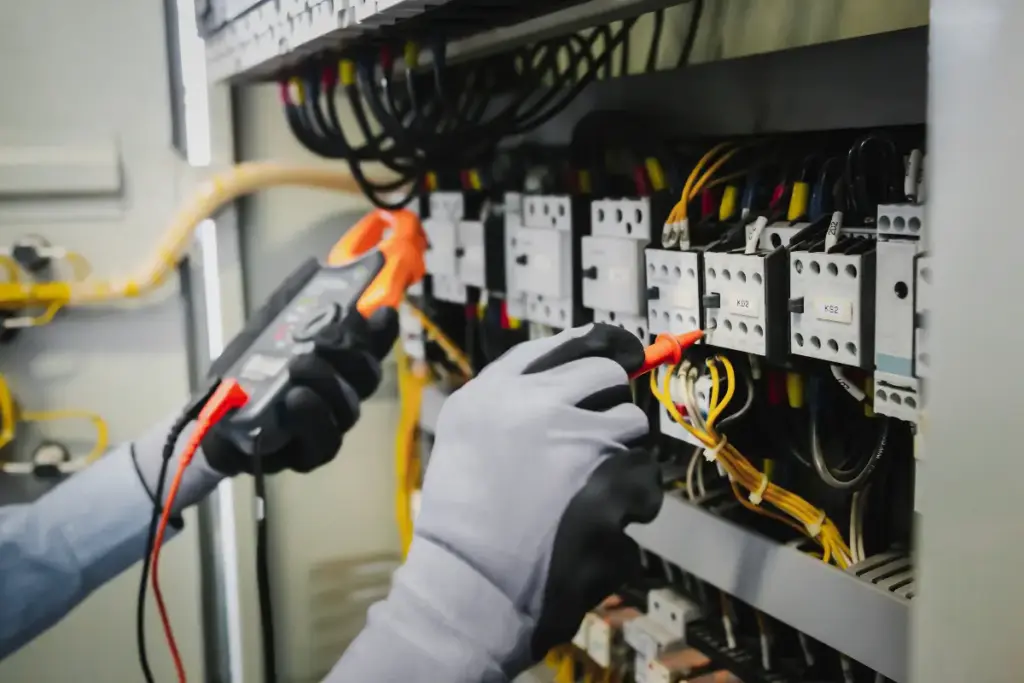
How to Read and Understand Your EICR Report
After understanding the legal importance of maintaining a valid EICR certificate, it’s equally important to know “what will the EICR report show”, you receive after an inspection.
The EICR (Electrical Installation Condition Report) assesses the safety of your electrical installations, and its findings are essential for maintaining compliance and operational safety.
The report typically includes three main components:
- Classification Codes: These codes indicate the urgency of any defects found.
- C1: Danger present, immediate action required.
- C2: Potentially dangerous, urgent action needed.
- C3: Improvement recommended.
- Findings: This section details the specific issues discovered during the inspection. It includes descriptions of the electrical system’s condition, noting where it fails to meet current standards.
- Recommendations: Based on the findings, this section outlines measures to address any faults or deficiencies. It’s vital for planning remedial actions. Learn more in detail about EICR codes.
Understanding these elements helps you grasp the severity and implications of each issue reported.
Prioritise addressing any C1 and C2 issues to guarantee safety and compliance.
Regularly consulting with a qualified electrician to discuss the EICR’s findings can also provide further clarity and guidance on necessary steps forward.
Qualified Electrician for Business EICR Testing Through Landlord Safety Certificate
When choosing an electrician for your business’s EICR testing, confirm they meet the requisite professional standards, including competence, certification, and NICEIC registration.
The Landlord Safety Certificate has a proven track record of reliability and adherence to safety protocols.
Here’s what you need to look for:
- Competence: Our electricians have the experience and technical expertise to deliver reliable, accurate inspections. We’ve built our reputation through successful projects, positive client feedback, and a clear understanding of each property’s specific needs.
- Certification: Every electrician on our team holds up-to-date qualifications that meet UK safety standards, including certifications from recognised institutions such as City & Guilds or EAL.
- NICEIC Registration: As a service provider registered from NICEIC, Landlord Safety Certificate ensures every inspection and report is completed to the highest standard. Our regular assessments guarantee that our work remains safe, compliant, and aligned with the latest electrical regulations.
Choosing the right professional is about securing safety and efficiency in your business operations.
Don’t hesitate to ask for documentation and proof of credentials before making a decision.
Frequently Asked Questions
How Often Should EICR Be Updated for a Business Property?
You should update your EICR for a business property every five years. It’s crucial to ensure your property’s electrical systems are safe and comply with legal standards to avoid potential hazards and legal issues.
Can a Business Perform Its Own EICR if It Has Qualified Staff?
Yes, you can perform your own EICR if you have qualified staff. They must be certified electricians competent in testing and inspection in accordance with UK national standards to ensure compliance and safety.
Are There Exemptions for Certain Types of Business Properties From EICR?
Yes, there are exemptions. If you’re running a business in certain types of properties, like places of worship or industrial sites with low public access, you might not need an EICR. Always check specific guidelines.
What Happens if Minor Faults Are Found During an EICR?
If minor faults are found during an EICR, you’ll receive recommendations for necessary repairs. You’re not legally bound to fix these immediately, but addressing them enhances safety and guarantees compliance with electrical standards.
How Long Does an EICR Inspection Typically Take?
An EICR inspection typically takes 3 to 4 hours for a small business. However, it can last longer depending on the size and complexity of your property’s electrical systems. Plan accordingly.
Conclusion
By now, you’re aware of the critical role regular EICR testing plays in ensuring the safety and compliance of your business’s electrical systems. Is EICR a legal requirement for business? Absolutely, and failing to fulfil this obligation can lead to serious risks. Staying on top of your EICR responsibilities not only keeps your premises safe but also protects you from hefty fines and legal action. Always choose a qualified electrician to carry out these tests to ensure your business operates smoothly and remains compliant. Remember, it’s more than just a legal duty; it’s an innovative and responsible business practice.


